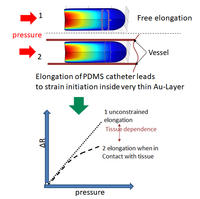Overview
In minimally invasive procedures concerning the vessels, a surgeon relies on image-based information of the intervention site, without any palpatory feedback. New medical instruments may “sense” relevant mechanical in situ tissue data from the site of operation. Combined real-time analysis of these obtained datasets with prior knowledge about a patient paves a promising route to an individual treatment of patients, e.g. in modern procedures of vessel interventions. For an effective individual treatment, quantitative data and real-time interpretation based on the patient’s status is essential. The project study is motivated by the idea of designing a functionalized balloon catheter device with integrated highly stretchable strain sensors that provide local tissue information.
Current research at ITeM
- FEM analysis: Using state of the art FEM tools to generate sensor-tissue interactions.
- Analytical modelling: Identification of local tissue properties (biomechanics) through sensor data and prediction of failure limits.
- Maximum information gain: Developing Mathematical techniques and sensor maneuvers for maximum information gain through limited data.
- Institute of Microsystems Technology (iMST), Furtwangen University
- BBraun Vascular Systems
